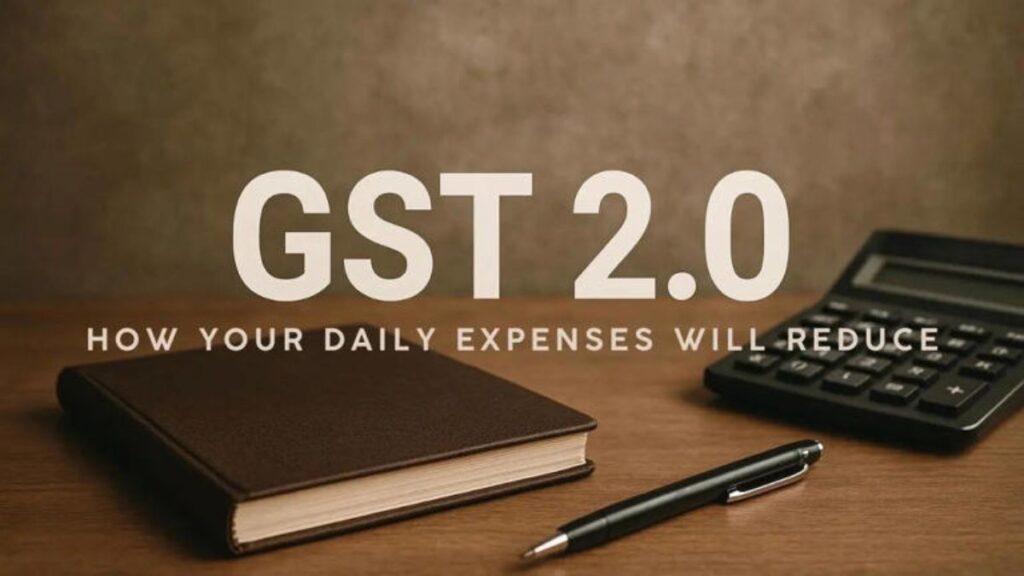How Much Will Your Daily Expenses Reduce as Nearly 375 Products Get Cheaper After GST Rate Cut?

Starting September 22, India will see one of the most significant tax reforms since the launch of the Goods and Services Tax (GST). The GST Council has simplified the system by reducing the number of slabs from four (5%, 12%, 18% and 28%) to just two – 5% and 18%. A special 40% rate will continue to apply to luxury and sin goods such as tobacco, pan masala, sugary beverages, luxury cars, and yachts.
Finance Minister Nirmala Sitharaman called the move a “Diwali gift” for consumers, highlighting that the reforms are aimed at easing the burden on the middle class, simplifying compliance, and improving ease of living.
What Gets Cheaper
With GST rationalisation, as many as 375 goods and services will now attract lower tax rates. This will directly reduce prices across food items, daily-use products, electronics, medicines, housing materials, and even services.
Food and Household Essentials
- Biscuits, butter, cereals, corn flakes, paneer, ghee, jam, ketchup, sausages, and namkeen.
- Milk-based beverages, fruit juices, ice cream, pastries, dry fruits, and tender coconut water.
- Packed drinking water (20-litre jars) will also see reduced prices.
Daily-Use FMCG Products
- Shampoos, soaps, hair oils, shaving cream, talcum powder, and face creams.
- Toothpaste, after-shave lotion, and toilet soaps.
Electronics and Appliances
- Air conditioners, washing machines, dishwashers, and televisions.
Medicines and Healthcare
- Several medicines and medical devices including diagnostic kits and glucometers will now attract just 5% GST.
- Pharma companies and retailers have been directed to revise MRPs to ensure the benefits reach consumers.
Services Sector
- GST cut for barbers, salons, gyms, fitness centres, health clubs, and yoga services.
Housing and Construction
- Cement tax reduced from 28% to 18%, which is expected to reduce overall housing costs.
Automobiles
- Small hatchbacks move from 28% GST plus cess to a flat 18% without cess.
- Effective September 22, leading carmakers have announced price cuts:
- Maruti Suzuki Alto K10: Up to ₹1,07,600 cheaper.
- Maruti Suzuki S-Presso: Price down by up to ₹1,29,600.
- Maruti Suzuki Celerio: Cut of up to ₹94,100.
- Maruti Suzuki WagonR: Reduced by up to ₹79,600.
- Maruti Suzuki Swift: Up to ₹84,600 lower.
- Maruti Suzuki Baleno: Price cut of up to ₹86,100.
- Maruti Suzuki Ignis: Reduced by up to ₹71,300.
- Tata Tiago: Price cut of up to ₹75,000.
- Tata Altroz: Reduction of up to ₹1,10,000.
- Hyundai Grand i10 Nios: Price down by up to ₹73,800.
- Hyundai i20: Reduced by up to ₹86,796.
Industry Response
FMCG, dairy, auto, and railway sectors have already announced price revisions in line with the GST cuts.
- Hindustan Unilever (HUL) has reduced prices on products like Dove shampoo, Lifebuoy soap, Horlicks, and Kissan jam.
- Dove shampoo (340 ml) will now cost ₹435, down from ₹490.
- Four-pack Lifebuoy soaps (75*4 gm) cut to ₹60 from ₹68.
- 200 gm Horlicks jar down to ₹110 from ₹130.
- 200 gm Kissan Jam now ₹80, down from ₹90.
- Amul has slashed prices on over 700 products.
- Butter cut to ₹58 per 100 gm from ₹62.
- Ghee reduced to ₹610 per litre from ₹650.
- Cheese block down to ₹545 per kg from ₹575.
- Paneer (200 gm) now ₹95, down from ₹99.
- Ice cream range reduced to ₹9–₹550, compared to earlier ₹10–₹600.
- Bakery products and frozen snacks also revised with noticeable cuts.
- Indian Railways has reduced the price of Rail Neer bottled water.
- 1-litre bottle now ₹14 (earlier ₹15).
- 500 ml bottle now ₹9 (earlier ₹10).
What Gets Costlier
While most essential goods and services have seen reductions, some products will become more expensive due to the higher 40% GST slab.
- Sugary and carbonated drinks: Coca-Cola, Pepsi, and other aerated beverages.
- Luxury and sin goods: Bidis, cigarettes, tobacco products, and pan masala.
- High-end automobiles: Petrol and diesel vehicles above 1200cc/1500cc and longer than 4,000 mm, including SUVs and luxury cars.
- Other luxury items: Motorcycles above 350cc, yachts, aircraft for personal use, racing cars, and smoking pipes.
Why It Matters
This reform is expected to:
- Reduce the tax burden on middle-class families.
- Lower prices across essential categories, from groceries to medicines.
- Provide a major boost to the automobile and housing sectors.
- Simplify compliance for businesses with just two slabs.
The real test, however, will be whether companies fully pass on these benefits to consumers in the coming weeks.









